Jerry B. Jenkins's Blog, page 40
June 7, 2011
Realism Through Research
Wednesday's Writing on Writing
Don't even think about starting your writing before doing your research.
Your story may be fictitious, but your details had better be correct. I mean, what would you think if you were reading an otherwise engrossing novel and came across this line: "When President John F. Kennedy was assassinated in Dallas,  Texas had been a state for only eighteen years."
Texas had been a state for only eighteen years."
Excuse me? Everyone knows Kennedy was shot in November of 1963. So Texas came into the Union in 1945? That's an egregious error. It took me sixty seconds to find the state's Web site and learn that Texas was annexed to the United States as the twenty-eighth state in 1845, seceded and joined the Confederacy in 1861, and was readmitted to the Union in 1870.
The story, once your premise has been accepted, must be logical. The technical details have to fit. And anachronisms will jar every time. One of my hobbies is to look for anachronisms – details out of place and time – in movies, stage plays, and novels. For instance, an American flag bearing fifty stars hanging on the wall of an office in the 1930s. Or, in a movie set in the 1950s, a suburban street with ramps carved out of the curbs at intersections so wheelchairs can maneuver easily.
maneuver easily.
Any American flag made from 1912 to 1959 would only bear forty-eight stars; Alaska and Hawaii were added in 1959. And laws requiring consideration of the disabled are fairly recent developments, too.
In a movie I saw that was set in the late 1930s, a housewife pulled a Tupperware container from the refrigerator. It made me wonder. A quick check on the Internet told me Tupperware made its debut in 1946. Careful writers avoid such gaffes.
June 6, 2011
How Cool Is This?
See the whole thing at http://www.leftbehind.com/
eBook available till June 15 for just $2.99 on Amazon
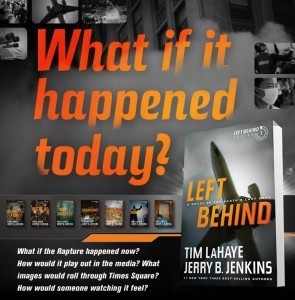
May 31, 2011
Writing for Your Soul
Wednesday's Writing on Writing
To create, we writers need full tanks, and I'm not talking about only writing resources. I'm talking about our emotional and spiritual well-being. For our physical health, any exercise is better than nothing.
The same is true with spiritual exercise; do whatever it takes to jump start your spiritual life — prayer, Bible reading, reflection, whatever. Don't feel like a failure if you haven't worked your way up to an hour a day. Anything is better than nothing — even slowly building those muscles.
Some people lament that they tried to read their Bible every day or to read it through in a year and got off track at some point. Others have said they resolved to read some sort of inspirational or self-help book every day, only to give up when they missed a day or two.
That thinking is flawed, of course. It's perfectionistic and will doom you to failure. Where is it written that if you ever miss, you have to quit?
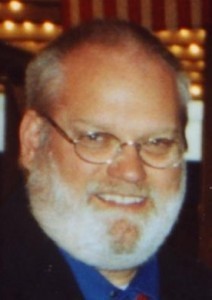 I used to be a victim of such thinking. For decades I carried an extra hundred pounds (yes, that's me in both pictures), and every few years I would take a serious run at losing it. I'd eat right and start walking every day, only to quit when I missed once after seventy-one straight days.
I used to be a victim of such thinking. For decades I carried an extra hundred pounds (yes, that's me in both pictures), and every few years I would take a serious run at losing it. I'd eat right and start walking every day, only to quit when I missed once after seventy-one straight days.
In my mind I had fallen off the wagon. I don't know where such craziness comes from. Did my missing one day negate all I had accomplished for those many weeks?
I have now maintained a 135-pound weight loss for eight years by keeping track of everything I eat, working out, and staying vigilant.
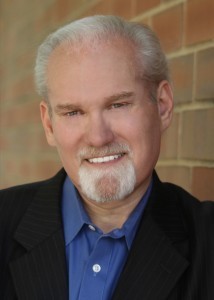 Part of the secret to this success is allowing myself to fail occasionally. Do I exceed my calorie counts sometimes? Miss a workout? Sure. I'm human. And I don't have to be perfect to succeed.
Part of the secret to this success is allowing myself to fail occasionally. Do I exceed my calorie counts sometimes? Miss a workout? Sure. I'm human. And I don't have to be perfect to succeed.
The same is true for developing our inner lives. Feed yours. And when you forget to pray or read your Bible, miss church, or get too busy or too lazy, just start over the next day. Cook your soul a small meal and get back on track.
You'll find it easier to write for other's souls when your own is healthy.
May 24, 2011
Memories of Billy Graham
Wednesday's Writing on Writing
One of the great privileges of my life was assisting Billy Graham with his memoir, Just As I Am. He's one of those rare 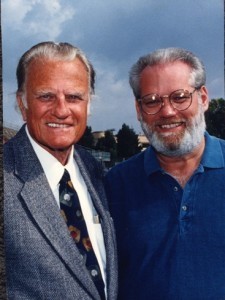 people who is the same behind closed doors as in public, and ironically it's his very humility that so attracts people to him.
people who is the same behind closed doors as in public, and ironically it's his very humility that so attracts people to him.
He is everything you would hope he would be, and more. What a thrill to work with him for more than a year. Most of that time was spent in musty little offices looking at records, reports, and films. But several weeks included interviewing him and spending time with him and his wife.
 Ruth Graham was one of the funniest people I have ever met. She once said: "If a husband and a wife agree all the time, one of them is unnecessary." Someone once asked if she had ever considered divorce. "Never," she said. "Homicide, but never divorce."
Ruth Graham was one of the funniest people I have ever met. She once said: "If a husband and a wife agree all the time, one of them is unnecessary." Someone once asked if she had ever considered divorce. "Never," she said. "Homicide, but never divorce."
Once, while Mr. Graham and I were taping at their home atop Black Mountain in Montreat, North Carolina, Ruth kept correcting him from another room. "Now Bill," she'd call out, "that wasn't 1949, that was 1951. And it wasn't Boston, it was Cleveland."
Mr. Graham would roll his eyes. Finally, he said, "Ruth, would you just let me handle my own memoirs?"
"I would," she said, "but they're starting to sound like your forgetoirs."
Ruth supervised the building of that home while Mr. Graham was in Europe for several weeks during the 1950s. The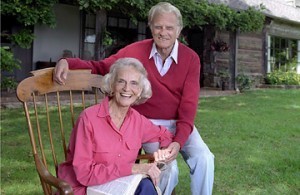 day Ruth drove her husband to the airport for his European trip, she said, "How many fireplaces can I have?"
day Ruth drove her husband to the airport for his European trip, she said, "How many fireplaces can I have?"
"No more than two," Mr. Graham said.
Upon his return, he found a beautiful home with five fireplaces. Ruth said, "I thought you said no fewer than two."
When recounting this story for me, she winked and said, "There comes a time to stop submitting and start outwitting."
Those fireplaces are part of the glory of that home, and in his age and infirmity, Mr. Graham loved them all – as I assume his wife knew he would.
At another point in our interviews, Mr. Graham related a story about how his first fiancée dumped him, long before he had met Ruth. In the middle of his tale, Ruth marched in and plopped down a big box of tissues in his lap. He squinted. "Did I ask for these?"
"No," she said, "but you sound like you need them."
When they had been married 60 years, Mr. Graham said, "We still maintain our lifetime love affair with our eyes."
May 20, 2011
Fun to Be Included Here
May 17, 2011
Your Perspective Party
Wednesday's Writing on Writing
Your choice of point of view can make or break your short story or novel.
 Veteran editor and Christian Writers Guild Board Member, Dave Lambert, says, "No decision you make in writing a story will have more impact on its shape and texture than your choice of point of view." I agree.
Veteran editor and Christian Writers Guild Board Member, Dave Lambert, says, "No decision you make in writing a story will have more impact on its shape and texture than your choice of point of view." I agree.
Imagine your story as a party with you as host. Your job is to choreograph the events so people feel comfortable and never wonder what's going on. Without being intrusive, your aim is to make sure everyone has a good time.
We've all been to parties where the host has not covered the basics. Although we don't expect our host to be the center of attention, we expect her to manage the details. When this is done right, we hardly notice. We simply know we've enjoyed ourselves. When details are neglected, everyone leaves with a bad taste.
center of attention, we expect her to manage the details. When this is done right, we hardly notice. We simply know we've enjoyed ourselves. When details are neglected, everyone leaves with a bad taste.
Picture yourself as the host of your fiction party. Invite readers to a treat. Don't take center stage, but manage the basics in such a way that the reader barely notices. Nothing should jar her as she engages with your characters and plot.
No one should notice that you followed the rules of perspective, that you limited your point of view to one character per scene. But they'll notice if you don't.
In my more than 100 novels, I've written in first-person, third-person, and omniscient points of view. There are many options: first person (singular or plural), second person, third person (single, multiple, subjective, and objective), and omniscient.
Regardless which you choose, there is one unbreakable rule: one perspective, one point of view per scene. Period.
When you violate this cardinal rule, few readers (unless they study writing) will think, Hey, she switched perspective characters on me! But they will feel like the underdressed partygoer, standing awkwardly in the middle of the room, not knowing what to do.
May 10, 2011
My Top Ten Writing Tips
Wednesday's Writing on Writing
As a working writer, you should be always sending out proposals – or coming up with new proposals to pitch. Never write to Dear Sir or To Whom It May Concern. Find and write directly to the appropriate person by name. Then, here are my top tips for query letters and proposals.
1. Do not use colored paper as stationery. Editors seem to universally see this as a sign of an amateur.
2. Do not use bold or LARGER-THAN-NORMAL type anywhere in a letter or manuscript, and never use more than one font.
3. Your title must be positive. Not "Don't Let Depression Defeat You," but rather: "Winning Over Depression."
 4. A manuscript, even transmitted electronically, must should be double-spaced (not single- or triple-spaced, or spaced at the 1.5 setting).
4. A manuscript, even transmitted electronically, must should be double-spaced (not single- or triple-spaced, or spaced at the 1.5 setting).
5. If the publisher asks for hard copy (rare these days), your manuscript should never be bound, stapled, clipped, or in a notebook. Editors want the pages in a stack, loose, with each page numbered and carrying the author's name.
6. The word by rarely appears on the cover of a book unless it is self-published, and even then it is the sign of an amateur.
7. The misspelling of the word acknowledgments (as acknowledgements, a British variation) or foreword (as forward) is another clue that you're an amateur. Foreword means "before the text"; it consists of fore and word, and has nothing to do with direction.
8. Your manuscript should not have justified right margins. Use ragged right margins, the kind that makes your manuscript appear to have been typed rather than computer generated. Justified margins cause inconsistent spacing between words, which make for difficult reading for overworked editors.
9. A common cliché in inspirational books is to include prayers in prefatory material. Even paraphrasing those to say, "My prayer is that God would…" is better than, "Lord, I pray…", but avoid either in the dedication or acknowledgments ("Lord, thank you for my wonderful editor…" Blech!).
10. You've heard the slogan Just do it. Now learn to Just say it. Imagine yourself telling your story to a friend or writing a letter. Good writing is not about loads of adjectives and adverbs. It consists of powerful nouns and verbs. So many beginners fall into an overwrought style I call "writtenese." Your relatives may love your flowery language, and perhaps your unpublished creative writing teacher does too, but read what sells. Usually you'll find it simple and straightforward.
May 5, 2011
New Reviews Posted
Janey DeMeo posted a review of The Brotherhood on her blog: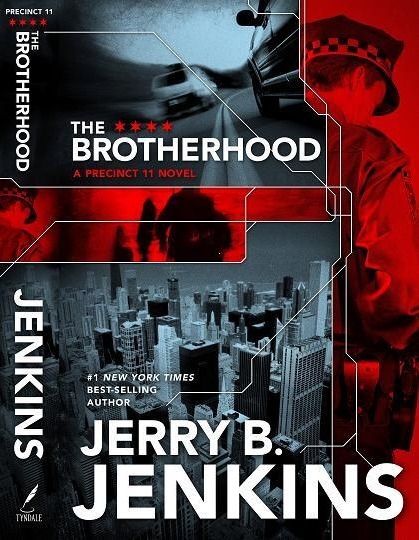
http://janey-demeo.blogspot.com/2011/05/brotherhood-precinct-11-novel.html
And in The San Diego Christian Perspectives Examiner:
http://www.examiner.com/christian-perspectives-in-san-diego/the-brotherhood-by-jerry-b-jenkins-review
May 3, 2011
Writing Credible Fiction
Wednesday's Writing on Writing
Most novelists draw from their own experience. We have to. I must put myself in the place of each of my characters: old, young, male, female, hero, villain, or utility character. I imagine myself as that person and decide how I would react and what I would say in every situation.
A caution: When writing about something wholly apart from you own experience, you'll want to do some thorough research first. I can imagine myself as the other gender, imagine how it would feel, say, to lose a child, imagine becoming so vengeful that I might want to kill someone. But if I were going to write about a mother who lost a child due to someone's carelessness or negligence or – worse – spite, I'd be wise to interview a woman who has endured such a tragedy.
I've seen countless movies and TV shows portraying homicide detectives. My father and two brother were cops. I've probably been exposed to more police stations and law enforcement officers than the average person.  But I wouldn't dare write a serious novel about homicide detectives without doing some real homework: ridealongs with real detectives, interviews, watching the detectives work.
But I wouldn't dare write a serious novel about homicide detectives without doing some real homework: ridealongs with real detectives, interviews, watching the detectives work.
Now, in The Brotherhood / A Precinct 11 Novel, when I wrote about my detective character approaching a locked apartment, not knowing whether someone on the other side could fire a shotgun blast through the door, I imagined my fear in the same situation. How the character handles that situation, however, came from careful research.
Most of the scenarios in the Left Behind series are imagined, of course. I haven't lived through the Rapture, but I have been scared to death. I was thirty blocks north of the World Trade Center when it was attacked. My imagination must fill in the blanks.
What would it be like to live through the aftermath of the Rapture, during the seven years of Tribulation? What if I were a new mother during this time? Would I consider killing my own child rather than have her fall into the hands of the enemy? How could a mother even think such a thing?
Citizens of Masada faced exactly that decision in 73 A.D. They killed their offspring and themselves rather than fall under the power of the enemy. To them, there was nothing worse than having their kids brainwashed, their beliefs obliterated.
History can help you make believable plotting decisions. It puts you in times and places centuries before you were born and makes you imagine what you might have done in the same situations. You cannot write credible characters otherwise.
April 26, 2011
A Light in the Valley
Wednesday's Writing on Writing
A unique opportunity came my way in the mid-1970s. I was asked to write the as-told-to autobiography of Cleveland-born Olympic runner Madeline Manning. She was a Christian and single mom, and she was the 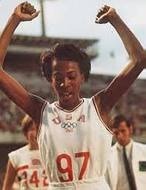 first world-class American woman in the 800-meter run.
first world-class American woman in the 800-meter run.
Madeline was a world record holder, and won the gold medal in the event at the 1968 Olympics in Mexico City. She had retired from competition in 1970, but returned in 1972 for the Munich games. After losing in the Olympic 800-meter semifinals, she won a silver on the 400-meter relay team.
Madeline retired again once more after the 1972 Olympics, but began competing again in 1975. She became the first American woman to break two minutes in the 800-meter, running a 1:59.8 at the 1976 Olympic trials.
Madeline felt God had called her to run in the Olympics in Montreal in 1976, and that He had told her she would shine there.
My job was to tell her story, the tale of an unlikely comeback Olympic winner.
The night before I was to go to Montreal to watch her run for the gold, I sat home watching her in the qualifying heat on television. She finished dead last. Eighth of eight. Of course she did not qualify for the finals.
My ticket was nonrefundable, but if I had learned anything about world-class athletes, it was that they faced their failures as grown-ups. I went to Montreal.
By the time I met with her, Madeline was bubbly and excited. Oh, she had had her explosion. She had raged and cried and wondered what she was to think of her conviction that God had told her she would shine.
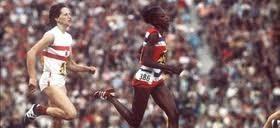 Why had she lost the semifinal? While watching the first semi, the one immediately before hers, she imagined herself in it. As the runners circled the 400-meter oval twice, Madeline mentally jockeyed for position, waited to make her move, then saw herself bursting past everyone for the win. She believed her body released chemicals that would have allowed her to run that first race well. She was spent before it was actually her turn in the second race.
Why had she lost the semifinal? While watching the first semi, the one immediately before hers, she imagined herself in it. As the runners circled the 400-meter oval twice, Madeline mentally jockeyed for position, waited to make her move, then saw herself bursting past everyone for the win. She believed her body released chemicals that would have allowed her to run that first race well. She was spent before it was actually her turn in the second race.
It was a huge error, especially for someone who should have known better. But Madeline wasn't alone in her loss. Many American athletes who had been favored to win medals that year lost. These suffering athletes came away hurt, angry, and depressed. And they looked to their mentor, the elder stateswoman, their spiritual leader.
By that time, Madeline believed God had revealed to her what his promise had meant. A light doesn't shine as brightly when seen from the mountaintop of victory. It is most effective illuminating in an otherwise dark valley, and that is where Madeline had found herself.
Finally coming to terms with her role, and having dealt with the disappointment of having come out of retirement and returning to world-class form only to lose, she set about counseling her teammates. Madeline came to believe she had been called to suffer in order to help others.
Frankly, that made for a better book too. It was called Running for Jesus.




